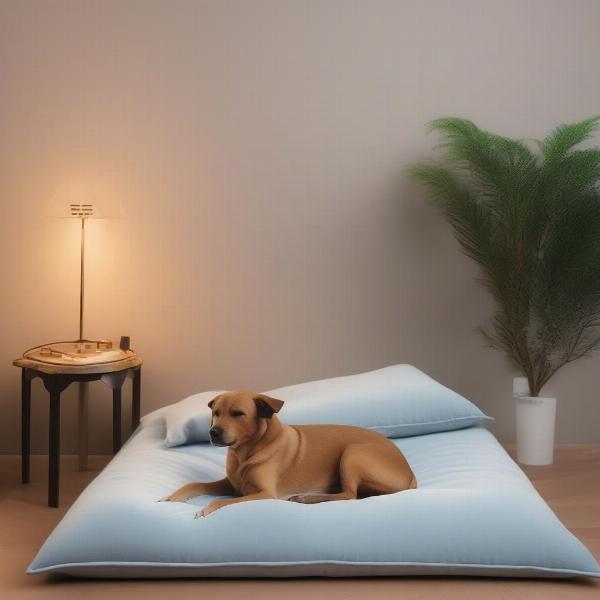Senior dog panting at night can be a worrying sign for owners. While some panting is normal, excessive or unusual panting can indicate an underlying health issue. Understanding the potential causes and knowing how to respond can help ensure your senior dog’s comfort and well-being. This article will explore common reasons for nighttime panting in older dogs, offer solutions, and advise when to seek veterinary care.
Why is My Older Dog Panting Excessively at Night?
As dogs age, they become more susceptible to various health conditions that can manifest as increased panting, especially at night. Several factors can contribute to this:
- Pain: Arthritis, hip dysplasia, and other age-related aches and pains can cause discomfort, leading to panting as a coping mechanism. This is especially true at night when they may struggle to find a comfortable position.
- Cognitive Dysfunction Syndrome (CDS): Similar to dementia in humans, CDS can cause confusion, anxiety, and changes in sleep patterns, often accompanied by increased panting.
- Heart Problems: Heart disease can make it difficult for a dog’s heart to efficiently pump blood, resulting in labored breathing and panting, particularly during periods of rest.
- Respiratory Issues: Conditions like asthma, bronchitis, or lung tumors can restrict airflow, making breathing more difficult and leading to panting.
- Obesity: Carrying extra weight puts a strain on a dog’s respiratory system, making them more prone to panting.
- Medication Side Effects: Certain medications can cause increased panting as a side effect.
- Heat Intolerance: Older dogs often have difficulty regulating their body temperature, making them more sensitive to heat and more likely to pant at night, even in a cool environment.
What Can I Do to Help My Senior Dog Stop Panting at Night?
Identifying the underlying cause of the panting is crucial for effective treatment. While some causes require veterinary intervention, there are several things you can do to help alleviate your dog’s discomfort:
- Comfortable Bedding: Provide a supportive orthopedic bed to ease joint pain and improve sleep quality.
- Cool Environment: Ensure the room is well-ventilated and at a comfortable temperature. Consider using a fan or air conditioning. animal heat lamps dogs might be helpful in some circumstances but consult with your vet first.
- Reduce Stress: Create a calm and predictable bedtime routine. Avoid loud noises and sudden changes in the environment.
- Weight Management: If your dog is overweight, work with your veterinarian to develop a safe and effective weight loss plan.
- Regular Exercise: Appropriate exercise can help maintain muscle strength, improve joint health, and reduce pain. Consult with your vet about the right type and amount of exercise for your senior dog.
When Should I Take My Senior Dog to the Vet for Panting?
If your senior dog’s panting is sudden, severe, accompanied by other symptoms (such as coughing, vomiting, or weakness), or if you are concerned, consult your veterinarian immediately. dog rapid shallow breathing can be a sign of a serious condition. Likewise, if your dog is dog restless, it might be a sign of pain or discomfort. Don’t hesitate to seek professional help.
Creating a Calm Sleeping Environment for Your Senior Dog
A peaceful sleeping environment is essential for senior dogs who may be experiencing anxiety or discomfort. A place to let sleeping dogs lie should be quiet, comfortable and offer a sense of security. This could include a dedicated dog bed, a quiet corner of the room, or even a crate if the dog is crate-trained.
 Creating a Calm Sleeping Environment
Creating a Calm Sleeping Environment
Conclusion
Senior dog panting at night can be a sign of various underlying health issues. Identifying the cause and implementing appropriate solutions can significantly improve your dog’s comfort and well-being. Remember to consult your veterinarian for accurate diagnosis and treatment. Addressing panting promptly can help ensure your senior companion enjoys a peaceful night’s sleep. old dog pants at night is a common concern, but by being observant and proactive, you can help your furry friend age gracefully.
FAQ
- Is panting at night always a sign of a serious problem in senior dogs? Not always. Some panting is normal, but excessive or sudden changes in panting patterns should be checked by a veterinarian.
- Can anxiety cause a senior dog to pant at night? Yes, anxiety and stress can contribute to increased panting.
- How can I make my senior dog’s bed more comfortable? Consider an orthopedic bed, extra blankets, or heating pads (with caution).
- What are the signs of Cognitive Dysfunction Syndrome in dogs? Signs include confusion, disorientation, changes in sleep patterns, increased anxiety, and house soiling.
- Should I change my senior dog’s diet if they are panting excessively at night? Consult your veterinarian before making any dietary changes.
- Are there any over-the-counter medications I can give my senior dog for panting? Never give your dog medication without consulting your veterinarian first.
- How can I tell if my senior dog is in pain? Signs of pain can include panting, restlessness, whining, changes in appetite, and reluctance to move.
About ILM Dog: ILM Dog is your trusted resource for comprehensive information on dog care, health, and well-being. We offer expert advice on everything from breed selection and puppy care to senior dog health and behavior. Our team of experienced writers and dog lovers are dedicated to providing accurate, up-to-date information to help you give your furry friend the best possible care. Contact us today for all your dog care needs! Email: [email protected], Phone: +44 20-3965-8624.